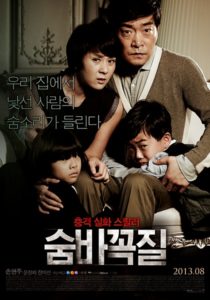Hide and Seek
捉迷藏
China, 2016, colour, 2.35:1, 100 mins.
Director: Liu Jie 刘杰.
Rating: 6/10.
Almost scene-by-scene remake of a Korean thriller has all the strengths and weaknesses of the original.
Qingdao city, Shandong province, northern China, the present day. In a rundown area of the city, in a block of flats due to be demolished, Lulu (Chun Xia) is murdered one night by a motorcycle helmet-wearing killer from the flat next door. In a comfortable part of town, yuppie couple Zhang Jiawei (Huo Jianhua) and his wife Pingzhi (Wan Qian), with their young daughter Zhang Zimeng (Li Yiqing), live in a luxury new high-rise. Zhang Jiawei is obsessive about cleanliness and becomes upset when a filthy tramp comes into the coffee shop-cum-florist he and his wife own and run. One day he receives a call that his elder brother, Zhang Jiahui (Zhao Xiang), has gone missing and hasn’t paid his rent; the landlord asks him to clear out his brother’s things. Unbeknown to Zhang Jiawei, the address is the same building in which Lulu was murdered a few days earlier, and the flat number (48) is the same as that in which the killer appeared to live. Zhang Jiawei is puzzled why his brother’s flat is full of women’s clothing. Meanwhile, waiting in the street outside, Pingzhi momentarily panics when her daughter disappears. She’s helped by a local woman, Su Hong (Qin Hailu), who also has a young daughter of the same age, Li Xiaoping (Fan Qianhui); she invites the family back for a coffee at her flat, which is next to that of Zhang Jiawei’s brother. However, when Zhang Jiawei says his brother used to live in No. 48, Su Hong throws them all out, claiming the brother was always peeping at her and her daughter. Pingzhi is further annoyed by the fact that Zhang Jiawei never told her he had a brother; he says he’ll explain everything in due course, but meanwhile will stay in the flat and wait for his brother to return. Next morning he finds his wallet gone and a hole in the wall connected to flat of the murdered Lulu. At the same time, his wife and daughter are almost murdered at home by the motorcycle helmet-wearing killer. Later, Zhang Jiawei tells Pingzhi that Zhang Jiahui, while still a teenager, was sent to a detention centre for rape, and was only released two years ago. It was his evidence that convicted his own brother, and as a result his late father left everything to him rather than Zhang Jiahui. He vows to Pinhgzhi that he’ll settle the matter, and drives back to the old block of flats.
REVIEW
The sins of the original are visited upon the remake in mystery-thriller Hide and Seek 捉迷藏, a virtually scene-by-scene duplication of the 2013 South Korean hit 숨바꼭질 along with all its attendant weaknesses and strengths. The story has been relocated painlessly from Seoul to Qingdao, and its underlying theme of an insulated yuppie class threatened by the lower orders also fits neatly into contemporary urban China. But the film, alas, has inherited the escalating ridiculousness of the original’s plot, which has way too many “why-don’t-they-just…?” moments for the film to really get under an audience’s skin.
The film underlines the further move into the mainstream by director Liu Jie 刘杰, 48, who  began with festival fare like Courthouse on Horseback 马背上的法庭 (2006) and Judge 透析 (2009) before making the beautifully crafted high school-cum-first love movie Young Style 青春派 (2013). Hide and Seek brings back the two leads of that last film, experienced actress Qin Hailu 秦海璐 and then-newcomer Dong Zijian 董子健, who played teacher and pupil; but though Qin gets her fair share of the thespian pie, Dong only gets a cameo appearance. The main acting burden on the male side goes to lead Huo Jianhua 霍建华 – Taiwan’s Gu Tianle 古天乐 [Louis Koo] lookalike – and the best that can be said about his wooden playing as the husband is that it replicates an equally blank one by South Korean character actor Son Hyeon-ju 손현주 | 孙贤周 in the original (see poster, left).
began with festival fare like Courthouse on Horseback 马背上的法庭 (2006) and Judge 透析 (2009) before making the beautifully crafted high school-cum-first love movie Young Style 青春派 (2013). Hide and Seek brings back the two leads of that last film, experienced actress Qin Hailu 秦海璐 and then-newcomer Dong Zijian 董子健, who played teacher and pupil; but though Qin gets her fair share of the thespian pie, Dong only gets a cameo appearance. The main acting burden on the male side goes to lead Huo Jianhua 霍建华 – Taiwan’s Gu Tianle 古天乐 [Louis Koo] lookalike – and the best that can be said about his wooden playing as the husband is that it replicates an equally blank one by South Korean character actor Son Hyeon-ju 손현주 | 孙贤周 in the original (see poster, left).
On a performance side, it’s largely the actresses who motor the movie. The formidable Qin, 38, who can do everything from arty (The Piano in a Factory 钢的琴, 2010; Return Ticket 到阜阳六百里, 2011) to genre (The House That Never Dies 京城81号, 2014), is glammed down here to a point where you have to blink twice to recognise her; but she sinks her teeth into the meaty role of the scared neighbour, and gets okay support from fellow Mainlander Wan Qian 万茜, 34, as the almost permanently endangered wife. With a sizeable role as the equally endangered young daughter, six-year-old Li Yiqing 李一情 pulls her weight creditably. (In the original the couple had two children, not one.)
Aside from the inherited plot implausibilities, which writers Ren Peng (The Great Hypnotist 催眠大师, 2014) and Gao Shan (Young Style) have done nothing to sort out, the film’s main problem is its pacing as a thriller, a genre that Liu has yet to master over a long span. After a spooky opening 10 minutes of the first murder – with Port of Call 踏雪寻梅 (2015) discovery Chun Xia 春夏, 24, in a strongly etched cameo – the film slowly tightens the screw during its first half to a tense setpiece of the mother and daughter almost being caught in their ritzy apartment block. The second half, marbled with flashbacks, is much weaker and, after the (genuinely surprising) Big Twist around the 70-minute mark, goes on for at least 10 minutes too long, allowing the initial tension to disperse and the plot’s holes to gape. The widescreen photography by d.p. Li Ran 李然, contrasting the couple’s spotless flat with the brother’s dilapidated residence, is spot-on, but as a thriller the film gets no help from the feeble score by South Korea’s experienced Bang Jun-seok 方晙硕, which is just noise.
The underlying theme of social threat from below (“I know where you live”) only really emerges in the creepy final shot, and its effectiveness is mitigated by lengthy intertitles at the beginning and end of the film explaining “paranoid mental disorders”. The South Korean original, written and directed by first-timer Heo Jeong 허정 | 许政, and with no big stars, was a surprise hit, grossing ₩38 trillion (5.6 million admissions). In the Mainland the Chinese remake grossed a so-so RMB71 million.
CREDITS
Presented by New Clues Film (CN), BDI Films (CN), Village Roadshow Pictures Asia (CN), Youth Enlight Pictures (CN), 3C Films (CN).
Script: Ren Peng, Gao Shan. Photography: Li Ran. Editing: Gao Shan. Music: Bang Jun-seok. Production design: Zhai Tao. Art direction: Huang Renliang. Costume design: Chen Yuye. Sound: Wang Danrong. Action: Bak Jeong-ryul. Executive direction: Zhao Xiang.
Cast: Huo Jianhua (Zhang Jiawei), Qin Hailu (Su Hong), Wan Qian (Pingzhi, Zhang Jiawei’s wife), Chun Xia [Li Junjie] (Lulu), Dong Zijian (Xiaodong, Lulu’s boyfriend), Li Yiqing (Zhang Zimeng, Zhang Jiawei’s daughter), Fan Qianhui (Li Xiaoping, Su Hong’s daughter), Zhao Xiang (Zhang Jiahui), Lu Youchen (young Zhang Jiawei), Chen Bingxu (young Zhang Jiahui).
Release: China, 4 Nov 2016.
